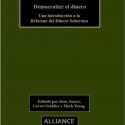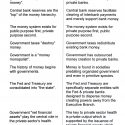The Alliance For Just Money is excited to have stepped into the publishing business by releasing a Spanish anthology of a dozen translations of high quality articles on the latest findings in monetary theory and on ongoing improved reasons for real monetary reform. The title is Democratizar el Dinero. Una introducción a la Reforma … Continue reading “Launch Announcement of Democratizar el Dinero”
Author: Govert Schuller
Triple-column Comparison
Triple-column Comparison between Modern Monetary Theory (MMT), the Actual Monetary System, and Sovereign Monetary Reform (SMR) A while ago I found a very useful double-column comparison of the concept of the monetary system in Modern Monetary Theory (MMT) and how the monetary system actually functions. The figure is titled: “Overview of MMT Flaws Relative … Continue reading “Triple-column Comparison”
Educational and Promotional Videos
VIDEOS ON MONETARY THEORY AND REFORM A. TOP 12 Videos B. Videos Produced in the Monetary Reform Movement C. Other Monetary Theory and Reform Videos of Interest D. Background Videos A. TOP 12 VIDEOS Bjerg, Ole. 2016. “Where does money come from?“ TEDxCopenhagen. 24 May 2016. Bongiovanni, Joe. 2013. “Why Monetary Reform … Continue reading “Educational and Promotional Videos”
On Trump: More on Alex Jones
Into the Grove In quite some ways the following is an instructive story. In July 2000 Alex Jones, Mike Hanson and British journalist Jon Ronson infiltrated the yearly Bohemian Grove gathering of very wealthy and well-connected people just north of San Francisco. They dressed up as preppy, casual CEOs and slipped into the estate … Continue reading “On Trump: More on Alex Jones”
The Operative Assumptions in Theosophy
If Theosophy is taken as a synthesis of science, philosophy and theology, together with its stated objectives of open dialogue, comparative investigation and experimentation, there will be a lot of room to overcome its own articles of faith, which in spite of its professed anti-dogmatic, free-thinking, non-partisan persona, are quite prevalent. For example there are … Continue reading “The Operative Assumptions in Theosophy”
The Tacit Dimension Operative in Phenomenology
Abstract This paper tries to assess the tacit dimension operative in the doing of phenomenology itself. The pre-phenomenological, pre-thematic naive skills of everyday abstraction and reflection comprise the tacit basis upon which phenomenology draws to do its work. In the natural attitude we are always already using these skills in daily life, and in the … Continue reading “The Tacit Dimension Operative in Phenomenology”
The Possibility Conditions of Narrative Identity
Each of us constructs and lives a ‘narrative’ . . . this narrative is us, our identities — Oliver Sacks. This dissertation is the fruit of my research on the concept of narrative identity, i.e. the claim that our sense of self is structured like a story. While investigating this concept it became clear that … Continue reading “The Possibility Conditions of Narrative Identity”
Bibracte: Last Center of Celtic Occultism?
The other day I visited David Reigle’s excellent web site of the Eastern Tradition Research Institute and found again his paper on “The Centennial Cycle.” In this paper he discusses the origin of the policy by the Brotherhood of Mahatmas of enlightening the “western barbarians” on a centennial basis. Here I read that the very last of … Continue reading “Bibracte: Last Center of Celtic Occultism?”
Nietzsche’s Reluctant Acceptance of Liberal Democracy (and later Rejection)
Introduction. The questions to be addressed in this essay are 1) whether we can extract from Nietzsche’s book Human, All Too Human, which was written in his more moderate science-oriented middle period, something of a political view; 2) whether this view can be construed, with some hedging here and there, as supporting modern liberal democracy; … Continue reading “Nietzsche’s Reluctant Acceptance of Liberal Democracy (and later Rejection)”
Darwinian Conservatism and the Liberal Welfare State
§1. Introduction. In his book Darwinian Conservatism the political scientist Larry Arnhart makes the case that traditional conservatism is the right political philosophy for humanity to follow because “it rests on a view of human nature that is supported by Darwinian biology” (Arnhart, 10). Arnhart developed his case by way of defending five propositions, each … Continue reading “Darwinian Conservatism and the Liberal Welfare State”


